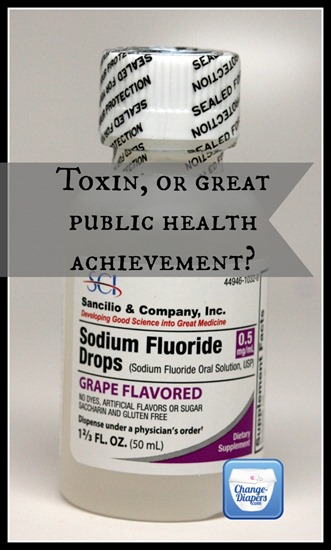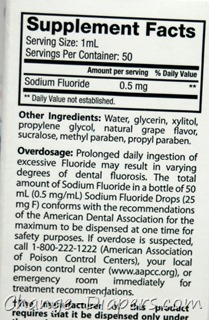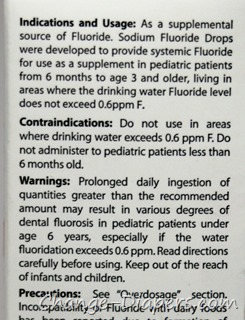
Until my daughter was 4 we had fluoridated city water, called one of the “Ten Great Public Health Achievements” of the 20th century by the CDC. If you have city water, you’ll be giving your children fluoride by default, unless you use only bottled water for everything, including cooking. Our dentist explained that even if your child doesn’t drink tap water, eating pasta cooked in fluoridated water is enough and no more is needed. I didn’t think much more about fluoride until we built our current house, which has well water.


Both our dentist and pediatrician recommended following ADA guidelines for fluoride supplementation. I read up a little on the history of fluoride supplementation as well as information from the EPA about fluoride in drinking water. My parents did not consume fluoride and had lots of dental problems. My sister, husband and I had well water and took fluoride supplements in the 80’s – my sister and husband got their first cavity in their twenties, I am 32 and (knock wood) no cavities yet. However, we were also taught excellent dental habits and were taken to the dentist regularly.
I concluded that I would follow recommendations and give my daughter the supplements. She used fluoride-free toothpaste until she was old enough to spit it out, at which point we switched to toothpaste with fluoride. She began losing her baby teeth at 5 and at age 9 she has all her adult teeth (even 12 year molars), all perfect with no decay.
My son was also prescribed fluoride supplements when he was 6 months old, and we gave them intermittently. He hasn’t gotten the hang of not swallowing toothpaste, so he still uses fluoride free toothpaste at age 4 1/2. We realized that we’d have a better chance of remembering to give the fluoride if it were upstairs, so we put it up high in the bathroom, where even I had to get a step stool to reach it. When my son was 3 we were headed downstairs and I realized he wasn’t right behind me. I went back upstairs and he was chewing something. Long story short, in the span of about 30 seconds he had climbed on the counter, opened the child resistant cap, and eaten the entire bottle. I flew down the stairs and called poison control, willing my hands and legs to stop shaking. It was one of the most terrifying moments of my life, since I had read about fluoride overdose in the past and was absolutely panicked. The man on the other end of the phone was awful, condescending, and did a great job of making me feel like the worst mother on earth. Fortunately, my son was fine, but it was the last time I gave fluoride. We got a prescription for my littlest guy but only gave it to him a handful of times. I really started to question both the safety and the necessity of fluoride supplementation.
Registered Dental Hygienist Carrie Ibbetson says “fluoride does work to an extent, but there are negative aspects of it, and it does not address the true issue behind cavities which is bacteria. Fluoride works by strengthening the outer layer of the tooth so that the acid in the bacteria has a harder time penetrating the teeth, but it does little to change the acids that the bacteria creates.” Carrie Ibbetson, Registered Dental Hygienist and Oral Health Coach – Natural Gumption
When I was a child, my two front teeth had brown streaks when the adult teeth came in. The dentist (at the time, we got away from him pretty quickly thank goodness) said it was an enamel deficiency, and his answer was (very poorly done) bonding. The thick bonding chipped off within weeks & was then ground down (fun times.) There’s enough bonding that you can no longer see those streaks, but the rest of my teeth are still mottled. When I was researching fluoride, I saw photos of flurosis that made me suspect that was what was going on with my teeth, and the “enamel deficiency” story was bull.
Dr. Peter Auster says: “Fluorosis is relatively common, some studies have said 1 in every 4 people however, the presence or lack of fluoride in local water supplies creates regional differences. As a cosmetic dentist, I often treat people who have noticeable problems due to fluorosis. It can show itself as tiny white specs on some teeth which requires no treatment or as large chalky areas with dark brown borders and pitting that can drastically affect self esteem. These cases can be treated with porcelain veneers or cosmetic bonding with an excellent result. Whitening alone can help but many times further treatment is needed. Indiscriminate prescribing of fluoride vitamins by Pediatricians along with water supply fluoride can add up when fluoride toothpastes are used as well.” (emphasis mine) Dr. Auster also notes that “on the other hand, fluoride has decreased tooth decay by as much as 40% and is highly recommended by the ADA.” Dr. Peter Auster (bio, PDF) of Cosmetic Dentistry Associates in Rockland County (and president of the NY & NJ AACD)
Over the years I’ve used every whitening strip, tray, gel & treatment I could find, but the mottling never went away – at best it removed the coffee staining. My dentist recently retired and I saw a new hygienist and dentist this year. Both of them immediately identified the mottling on my teeth as dental fluorisis, without my saying anything about it. They suggested that the dentist may have given me the incorrect dose, that the well water could have contained fluoride (we had terrible water so we did not drink it at all), but that basically I was overdosed on fluoride in one way or another. A friend of ours was told by her child’s doctor that the amount of fluoride in the toothpaste her child was likely to swallow was enough, and they didn’t need to give supplements. So maybe I was just eating a lot of toothpaste as a kid, I don’t know.
Some people may think it’s a no brainer – no way are they giving their child something often called a neuro-toxin. For me, it wasn’t that easy. I want my children to have healthy teeth. Was the fluoride the reason for my healthy teeth, or was it brushing 2-3 times per day, flossing daily, and visiting the dentist every six months? Even at age 9, we still “check” my daughter’s teeth after she brushes, the kids have floss picks to floss with and go to the dentist twice per year. We eat a healthy, balanced diet that’s nutrient rich, don’t drink sodas etc. Is that more important than fluoride? What were the diets & hygiene like of the people for whom fluoride was immensely effective?
“As with so many things (including nutrients) that we take into our bodies, ‘the dose makes the poison.’ In this part of the world, this generally means you won’t ingest a toxic dose by drinking fluoridated water. There are some parts of the developing world in which fluoride concentrations approach levels which would indicate a risk of chronic toxicity–either due to naturally high levels in ground water or due to pollution. The evidence for the effectiveness of fluoride in preventing tooth decay is very strong. […] As a dentist who has had practices in both fluoridated and non-fluoridated areas […] looking at large populations, patients in fluoridated areas have far less decay than those whose water supply is not fluoridated. Fluoride however has made its way into much of the food and drinks we ingest. For this reason the benefit of water fluoridation is not as easily seen as it was in the past.” – Steven Bornfeld, DDS is a dentist in private practice in Brooklyn NY since 1977. Dr. Bornfeld also says “My feeling is that most cases of fluorosis occur in people whose parents put too much fluoridated toothpaste on their toothbrushes when they were very young. Young children are not effective rinsers, which means a good part of the toothpaste gets swallowed. Fluoridated toothpastes have a fluoride concentration about a thousand times that of properly fluoridated water, so it doesn’t take much to cause problems. For that reason pediatric dentists advise parents to use no more than a “pea-sized” portion of fluoridated toothpaste on their childrens’ brushes.” (emphasis mine)
There’s no solution for fluorosis aside from incredibly expensive veneers, which need to be maintained and potentially replaced over the years. I realize I sound like I care more about cosmetics than I do about dental health or toxins, but it is devastating to not want to smile & to be looked at like you have “dirty” teeth when fluorosis is not the child’s fault.
Whether or not to give fluoride can be a difficult decision, since there’s no undoing it, and you won’t know the effect of your decision until your child’s adult teeth come in.
Do you have fluoridated water? Do you drink it? If you do not use fluoride topically or systemically, do you take extra steps to avoid tooth decay?









 Maria wants to live in a world where cloth diapers are the norm and moms can make parenting choices without judgement. When she’s not chasing her 18, 14 and 11-year old kids around, you might find her checking out the latest gadgets, organizing something (again) or exercising in the fresh air.
Maria wants to live in a world where cloth diapers are the norm and moms can make parenting choices without judgement. When she’s not chasing her 18, 14 and 11-year old kids around, you might find her checking out the latest gadgets, organizing something (again) or exercising in the fresh air. 







ok so I tried to retain as much info from this article as I could but thats just not my strong point…My 3 year old is getting brown spots on her teeth already 🙁 we have well water and she uses fluoride free tooth paste with me and fluoride tooth paste a few times a month at her dads house. I have no idea whats happening to her teeth but they look similar to the pictures you linked in the article but its only 2 of them. Ive been talking to two hygienist trying to figure out a solution and they both recommend fluoride rinses. She only drinks well water so they also mentioned it could be decalcification. I hope her permanent teeth are healthier
Hmm…if she rarely has fluoride it doesn’t seem like it would be fluorosis. MI paste is something you can ask your dentist about (to recalcify teeth) BUT it contains fluoride.
[…] i compensated for this post, and all opinions are my own. I’m always on the lookout for new fluoride-free toothpaste. We’ve used Jason Kids Only, Weleda tooth gel, and most often, Tom’s of […]
https://www.facebook.com/l.php?u=https%3A%2F%2Fwww.youtube.com%2Fwatch%3Fv%3DGX0s-4AyWfI&h=RAQG8bKHR
It can be helpful to look at the issue globally for perspective. Dental caries rates have declined dramatically in developed countries all over the world – most of which do NOT add fluoride to the water supply. This tells me that diet, lifestyle and just plain keeping your teeth clean are the major contributors to good oral health. Even more interesting is the rational these nations based their decisions on: they don’t feel the government has any business “medicating” the populace through its public water supply. That really resonates with me!
Fortunately, we just moved into a house that is supplied by rural water, which is non-fluoridated. I’m now looking into fluoride-free toothpastes as well.
Great post, Maria!
The reason your childrens’ teeth are in good shape has more to do with genetics and diet rather than the use of fluoride. In my experience I watched my oldest daughter’s teeth rot before my very eyes. She got all her teeth by the age of 2 and I had to brush them regularly, which was a struggle. Despite this, I noticed pitting and brown spots that eventually became severe tooth decay. My journey took me in a different direction as I discovered the Weston A. Price diet and used a fluoride filter that removes most of the fluoride since we were on city water at the time. Her teeth improved dramatically on this diet and with the removal of fluoride. However, her baby teeth still bear marks of fluorosis. I grew up on well water that was unfluoridated and my parents were never given the advice from dentists to give fluoride supplements. Anyway, my teeth were smooth, white and in good shape growing up. I had a few cavities that were filled with mercury fillings and thank goodness were replaced later with resin. But for the most part, I had pretty good oral health. It wasn’t until I moved with my husband all over the country because he was in the military that I began to notice my adult teeth were getting regular cavities and gum recession. The places we lived were all on city water and were fluoridated. I was still brushing with fluoride toothpaste then and it wasn’t until I started reading into the dangers of fluoride and the different types, that I switched to unfluoridated for my family. The type of fluoride they put in municipal water is Fluorosilicic acid and it comes from industrial waste run-off from the phosphate fertilizer industry. This stuff is considered hazardous waste and hazmat suits are required for handling. I’ve also seen this stuff dissolve pavements after a spill. The type in fluoride toothpaste is sodium fluoride and is also used as an insecticide/pesticide. Fluoride is a bioaccumulative toxin so over time it can lead to bone fluorosis, osteoperosis, thyroid disorders and cancer. Many anti-depressants also contain fluoride (fluoroquinolones) and pesticides as well so we’re getting fluoride from many different sources besides water. Some people are affected sooner than others, which I think could be the case of my daughter. Since limiting grains, processed sugar (high fructose corn syrup) and avoiding gluten (turns out I’m also celiac and there’s a host of problems associated with undiagnosed gluten sensitivity) and taking regular doses of fermented cod liver oil, use unfluoridated toothpaste and are back on well water, I’ve noticed a dramatic change in health for my entire family. Not just oral health, but also overall health and mental well-being. My daughter used to have regular melt-downs past the terrible 2’s into the terrible 3s and 4s and now she seems much calmer and much more in control of her emotions. For me the proof is in the changes we made and those we are continuing to make regarding health.
I think there is a lot to be said for our diet and hereditary issues as well. When I was about 25 my dentist got very upset with me because I was showing signs of periodontal (or gum) disease and he said I must have been not taking care of my gums. What he didn’t know is that my dad has had it for years, made sure I had excellent dental habits because of it, and I DO take very good care of my teeth.
That being said, I grew up with non-fluoride well water and our city water where we live doesn’t contain it and I still have never had a cavity (I’m 32). Our dentist gave up a prescription for some fluoride tablets, but I kinda forgot to fill it.
About the time I was thinking about it again, my baby developed hypothyroidism and in my research on things that suppress the thyroid and fluoride is one of those things. We decided extra fluoride was not something that would not be worth it to us.
All that to say… it’s really something you have to look at for your family. If my family of terrible tooth decay I might consider it. Good luck with your decision!